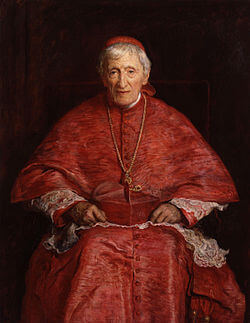What type of man are you?
Many a lady on CatholicMatch, when asked what kind of man they are looking for, will respond with some variation of "a true Christian gentleman."
Given the shortage of men owning ancestral lands and possessing a coat of arms, my guess is that the primary meaning of the term ‘gentleman’ is not intended here.
Trouble is that, apart from the primary definition, the ‘gentleman’ can be difficult to pin down. To be a gentleman, like to be a Christian, is perhaps something that is better understood in the living than the defining.
However, since we must start somewhere...
St. Cardinal Newman (a man who knew something of being both a Christian and a gentleman) offered this definition (abridged: the full description can be found in his Idea of a University):

It is almost a definition of a gentleman to say he is one who never inflicts pain…The true gentleman…carefully avoids whatever may cause a jar or a jolt in the minds of those with whom he is cast;—all clashing of opinion, or collision of feeling, all restraint, or suspicion, or gloom, or resentment; his great concern being to make every one at their ease and at home.
He has his eyes on all his company; he is tender towards the bashful, gentle towards the distant, and merciful towards the absurd; he can recollect to whom he is speaking; he guards against unseasonable allusions, or topics which may irritate; he is seldom prominent in conversation, and never wearisome.
He makes light of favours while he does them, and seems to be receiving when he is conferring. He never speaks of himself except when compelled, never defends himself by a mere retort, he has no ears for slander or gossip, is scrupulous in imputing motives to those who interfere with him, and interprets every thing for the best…
He has too much good sense to be affronted at insults, he is too well employed to remember injuries, and too indolent to bear malice. He is patient, forbearing, and resigned, on philosophical principles; he submits to pain, because it is inevitable, to bereavement, because it is irreparable, and to death, because it is his destiny. If he engages in controversy of any kind, his disciplined intellect preserves him from the blunder.
The Saint is here speaking of the ideal of a secular gentleman: of "gentlemanly behavior as such" you might say.
Obviously, Cardinal Newman is the last man in existence who would take this to the extreme of hiding your faith or compromising the truth to avoid giving offense: he gave plenty of "jars and jolts" in the course of his life, not the least being scandalizing a good portion of the nation by converting to the Church of Rome.
But the idea is that a gentleman avoids any unnecessary offense and seeks to make the other person or people as comfortable as possible. Lord knows that’s a challenge enough, and it is here that we can truly stand out in today’s world.
How often do we hear loud profanity in public places? How often does someone interrupt a conversation to take a phone call or check a text message? How often do we see people walking around with shirts bearing aggressive or controversial slogans?
How often do we make casual slights or aggressive comments against things we know other people may value while in mixed company? How often do we assume the worst interpretation of other people's behavior?
To be a gentleman would mean avoiding all of this.
It’s really rather simple; don’t do what you know may irritate or offend people if you can avoid it, and try not to take offense in your turn. Granted in today’s world certain people may be offended by things you really cannot or should not avoid, such as praying in public or wearing a crucifix, or holding to certain views. As with Cardinal Newman’s conversion, these sorts of ‘irritants’ transcend mere manners.
But I hope no one here reading this thinks that choice of clothing, or of language, or of what topics we choose to discuss in public or when we decide to check our phone are in quite the same category as displays of faith.
As heirs to the rebellious Baby Boomers, the answer may come back, "But I'm entitled to express myself however I like, or whenever I like, or to wear whatever I like" or some other such commonplace. For the sake of the current discussion, I will even grant them to be true. The question, though, is which do you value more: your own comfort or pleasure in saying and doing these things, or the other person’s comfort?
Are you really not willing to make even the minor sacrifice of watching your language, diverting from certain subjects, and foregoing to wear certain things for the sake of making those around you more comfortable? If so, then you are no gentleman. It is as simple as that.
Herein indeed lies the great value of being a gentleman.
It requires you to put the other person first; to subordinate your own wishes to their comfort. As another great English Catholic, Professor Tolkien, put it; “Touching your cap to the Squire may be dam’ bad for the Squire, but it’s dam’ good for you.”
In other words, to be a gentleman is an expression of charity and humility; of making even the smallest and most seemingly pointless gestures on behalf of the other person, sacrificing your will in minor things to make someone else’s life that much easier.
That’s why so many women hope to marry one.


